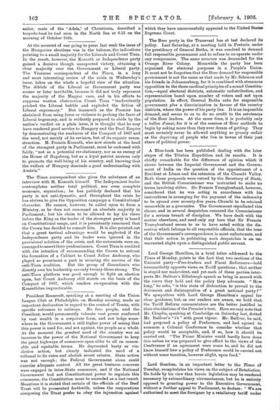At the moment of our going to press last week
the issue of the Hungarian elections was in the balance, the indications pointing to a small majority for the Liberals and Count Tisza. In the result, however, the Kossuth or Independence party gained a decisive though unexpected victory, obtaining a clear majority over the Government or Liberal party. The Viennese correspondent of the Times, in a long and most interesting review of the crisis in Wednesday's issue, takes on the whole a hopeful view of the situation. The dibdcle of the Liberal or Government party was sooner or later inevitable, because it did not truly represent the majority of the Magyar race, and in his efforts to suppress wanton obstruction Count Tisza " inadvertently pricked the Liberal bubble and exploded the fiction of Liberal supremacy." But inasmuch as the Premier has abstained from using force or violence to prolong the farce of Liberal hegemony, and is evidently prepared to abide by the nation's verdict on a plain issue, it is thought that he may have rendered good service to Hungary and the Dual Empire by demonstrating the weakness of the Compact of 1867 and the need, not merely of its revision, but of its organic recon- struction. M. Francis Kossuth, who now stands at the head of the strongest party in Parliament, must be reckoned with fairly, " not as a potential revolutionary, nor as an enemy of the House of Hapsburg, but as a loyal patriot anxious only to promote the well-being of his country, and knowing that the welfare of Hungary demands a good understanding with Austria."










































 Previous page
Previous page